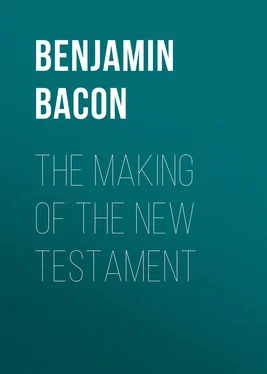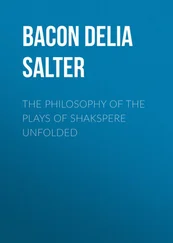Benjamin Bacon - The Making of the New Testament
Здесь есть возможность читать онлайн «Benjamin Bacon - The Making of the New Testament» — ознакомительный отрывок электронной книги совершенно бесплатно, а после прочтения отрывка купить полную версию. В некоторых случаях можно слушать аудио, скачать через торрент в формате fb2 и присутствует краткое содержание. ISBN: , Жанр: foreign_antique, foreign_prose, на английском языке. Описание произведения, (предисловие) а так же отзывы посетителей доступны на портале библиотеки ЛибКат.
- Название:The Making of the New Testament
- Автор:
- Жанр:
- Год:неизвестен
- ISBN:http://www.gutenberg.org/ebooks/39288
- Рейтинг книги:5 / 5. Голосов: 1
-
Избранное:Добавить в избранное
- Отзывы:
-
Ваша оценка:
- 100
- 1
- 2
- 3
- 4
- 5
The Making of the New Testament: краткое содержание, описание и аннотация
Предлагаем к чтению аннотацию, описание, краткое содержание или предисловие (зависит от того, что написал сам автор книги «The Making of the New Testament»). Если вы не нашли необходимую информацию о книге — напишите в комментариях, мы постараемся отыскать её.
The Making of the New Testament — читать онлайн ознакомительный отрывок
Ниже представлен текст книги, разбитый по страницам. Система сохранения места последней прочитанной страницы, позволяет с удобством читать онлайн бесплатно книгу «The Making of the New Testament», без необходимости каждый раз заново искать на чём Вы остановились. Поставьте закладку, и сможете в любой момент перейти на страницу, на которой закончили чтение.
Интервал:
Закладка:
Baur's conception of the course of events in this momentous century has been described as a theory of historical progress by fusion of opposites in a higher unity. The Hegelian scheme of thesis, antithesis and synthesis had in fact some justification in the recognized phenomena of the development of Christianity. It had sprung from Judaism, overcoming the particularism of that still nationalistic faith by the sense of its mission to the world at large. The conflict acknowledged in all the sources and most vividly reflected in the great Epistles of Paul to the Galatians, Corinthians and Romans, a conflict between those who conceived Christianity as a universal religion, and those who looked upon it as only a reformed, spiritualized and perfected Judaism, was the characteristic phenomenon of the first or apostolic age. It was the struggle of the infant faith against its swaddling bands. The critical historian is compelled to estimate all later, anonymous, accounts of this development in the light of the confessedly earlier, and indubitably authentic records, the four great Epistles of Paul; for these simply reflect the actual conditions, and are not affected by the later disposition to idealize the story. Thesis and antithesis were therefore really in evidence at the beginnings.
Equal unanimity prevailed as to the close of the period in question. In a. d. 150 to 200, Christianity was solidifying into the 'catholic' church, rejecting extremes of doctrine on both sides, formulating its 'rule of faith,' determining its canon, centralizing administrative control. It had thrown off as heretical upon the extreme left Marcion and the Gnostics, who either repudiated the Jewish scriptures altogether, or interpreted them with more than Pauline freedom. On the extreme right it had renounced the unprogressive Ebionites of Palestine, still unreconciled to Paul, and insistent on submission to the Law for Jew and Gentile, as the condition of a 'share in the world to come.' What could be imagined as to the course of events in the intervening century of obscurity? Must it not have witnessed a progressive divergence of the extremes of Paulinists and Judaizers, coincidently with a rapprochement of the moderates from the side of Peter and that of Paul respectively? Baur's outline seemed thus to describe adequately the main course of events. He relied upon internal evidence to determine the dates of the disputed writings and their relation to it. But 'criticism of the canon' in Baur's own, and in the preceding generation, had come to include among the writings of doubtful date and authenticity not only those disputed in antiquity, and the anonymous narrative books, but also 1st Peter and the minor Epistles of Paul. Nothing strictly apostolic was left save the four great Epistles of Paul.
The theory of Baur and the Tübingen school (for so his followers came to be designated) was broadly conceived and ably advocated. In two vital respects it has had permanent influence. (1) Criticism, as already noted, has ceased to be mere debate about text and canon, and concerns itself to-day primarily with the history of Christian ideas as embodied in its primitive literature. Its problem is to relate the New Testament writings, together with all other cognate material, to the history of the developing religion from its earliest traceable form in the greater Pauline Epistles to where it emerges into the full light of day toward the close of the second century. (2) Again, Baur's outline of the process through which the nascent faith attained to full self-consciousness as a world-religion required correction rather than disproof. It was a grievous mistake to identify Peter, James, and John with those whom Paul bitterly denounces as Judaizing "false brethren," "super extra apostles," "ministers of Satan." It was a perversion of internal evidence to reject as post-Pauline the Epistles of the later period such as Philippians and Colossians, on the ground that Paul himself did not live to participate in the second crisis, the defence of his doctrine against perversion on the side of mystical, Hellenistic theosophy. The great Epistles written under the name of Paul from the period of his captivity are innocent of reference to the developed Gnostic systems of the second century. They antagonize only an incipient tendency in this direction.
But while the transition of a. d. 50-150 was both deeper and more complex than Baur conceived, the transfer of the gospel during that century from Jewish to Gentile soil is really the great outstanding fact, against which as a background the literature must be read; and the initial stage of the process is marked by the controversy of Paul with the Galilean apostles. What we must call, in distinction from Paulinism, 'apostolic' Christianity is well represented in the Book of Acts. Paul's writings show that he felt himself and his churches to represent an independent type of Christianity in all respects equal to the 'apostolic,' the problem being unification of the two. Now it is axiomatic that the investigator must proceed from the relatively known and determinable to the unknown and disputable. Accordingly it is in reality from the Epistolary literature of the church, in particular the greater Pauline Epistles, that he must take his start. As a source for our understanding of the development of the life of the church the Literature of the Apostle, directly participant in the conflicts and issues of the times, even if in its later elements of doubtful or pseudonymous authorship, takes precedence as a whole over the Literature of the Catechist, with its later and more or less idealized narration, exemplified in the Book of Acts.
Modern criticism acknowledges, then, its indebtedness to the Tübingen school for a clearer definition of both its task and method, by concentrating attention upon the contrast between the Petrine and the Pauline conception of 'the gospel.' Still it must be admitted that most of the inferences first drawn have since been overthrown. In their chronological scheme of the New Testament writings the Tübingen critics under-estimated the force of the external evidences (including early tradition) and misinterpreted the internal. New discovery and more careful study of literary relations have inverted Baur's views as to dates of the Johannine writings. Four of these (the Gospel and three Epistles) are anonymous. Baur's date for these has been forced back by no less than half a century. The fifth (Revelation) bears the name of John, but was hotly disputed as pseudonymous in the second century, and even by its supporters was dated so late as "the end of the reign of Domitian" (95). The Tübingen school placed Revelation thirty years earlier, and attributed it to the Apostle. Modern criticism emphatically reverts to the ancient date, and regards the book as pseudonymous, or as written by "some other John."
Again the relative dates of the Synoptic writings (Matthew, Mark, Luke-Acts) were inverted by the Tübingen critics, primarily through wrong application of their theory of doctrinal development; secondarily, and as a consequence, through misinterpretation of the intricate literary relationships. Present-day criticism considers it established that Mark is the oldest of the three, taken up by each of the other two. There is almost equal unanimity in regarding the discourse material common to Matthew and Luke and variously combined by each with Mark, as independently drawn by them from the book of the "Precepts of the Lord," reported by Papias to have been compiled by Matthew "in the Hebrew ( i. e. Aramaic) tongue." Tübingen gospel criticism is thus almost entirely set aside, in favour of the so-called 'Two-document' theory.
So with the Pauline Epistles of the second period. Doubt still clings to Ephesians. It had been treated by some as pseudo-Pauline even before the time of Baur; but Baur's own followers soon receded from his extreme application of his theory to the internal evidence of Philippians, Colossians and Philemon. It became evident that Paul's "gospel" included something more than the mere antithesis of Law and Grace. He had other opponents than the Judaizers, and had to defend his doctrine against perversion by Grecizing mystics as well as against opposition by Pharisaic legalists.
Читать дальшеИнтервал:
Закладка:
Похожие книги на «The Making of the New Testament»
Представляем Вашему вниманию похожие книги на «The Making of the New Testament» списком для выбора. Мы отобрали схожую по названию и смыслу литературу в надежде предоставить читателям больше вариантов отыскать новые, интересные, ещё непрочитанные произведения.
Обсуждение, отзывы о книге «The Making of the New Testament» и просто собственные мнения читателей. Оставьте ваши комментарии, напишите, что Вы думаете о произведении, его смысле или главных героях. Укажите что конкретно понравилось, а что нет, и почему Вы так считаете.












